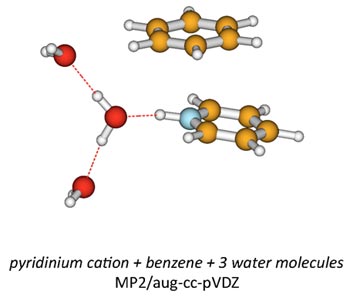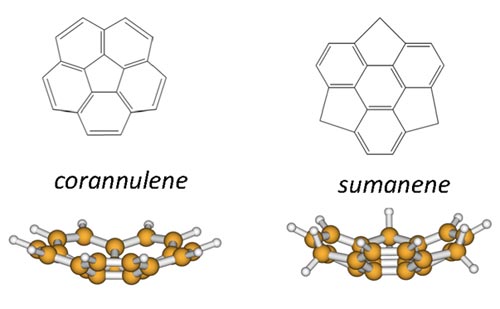Rodríguez Otero
Líneas de investigación
Modelado computacional de interacciones no covalentes que involucran nanoestructuras moleculares
Miembros del grupo
| González Veloso, Iván |
Inv. Predoctoral |
Investigación
GRUPO DE INVESTIGACIÓN DEL CIQUS DURANTE 2011-2018
Computational study of the modulation of the cation•••pi interaction by the enviroment
One of the factors that control the stability of proteins is the interaction between cations and aromatic species in the side chains of some amino acids. Several studies suggest that this type of interaction is present in a variety of systems suggesting that it could be relevant in various processes of chemical and biological recognition.
Everything seems to indicate that the environment of the interacting species may affect the characteristics of the interaction, either causing changes in intensity or changes in the geometric disposition of the interacting fragments.
Thus, we are conducting a thorough study of this kind of interactions in cation•••pi systems of interest, trying to clarify essentially which are the main features of such interactions and whether they can be relevant for the stability of real systems.
Therefore, it also aims to quantify the role played by the environment on these interactions, and whether it can act as a modulator of them, either weakening or causing significant structural changes.

Theoretical study of the intermolecular interaction with polycyclic aromatic hydrocarbons with curved surfaces (buckybowls)
Buckybowls are curved-surface, polynuclear aromatic hydrocarbons, PAH, with carbon frameworks that can be identified on the buckminsterfullerene (C60) surface. The simplest members of this family are corannulene and sumanene. Buckybowl compounds differ from traditional polyaromatic hydrocarbons in that they are strained (curved) and have both concave and convex surfaces.
Therefore, from a coordination chemistry viewpoint, buckybowls are unique ligands because they can provide to different faces for binding.

GRUPO DE INVESTIGACIÓN DEL CIQUS DURANTE 2011-2018


